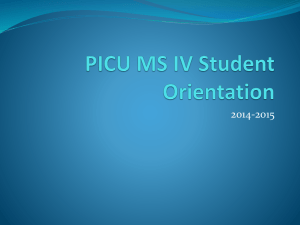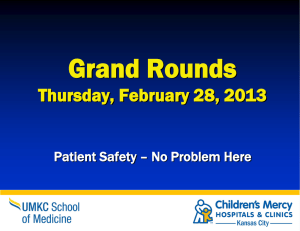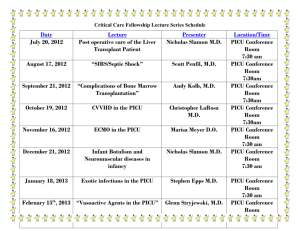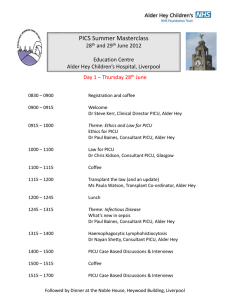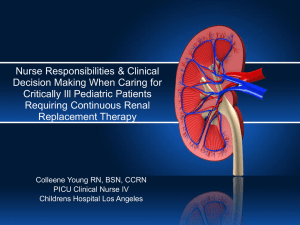Rotation Expectations - Stony Brook University School of Medicine
advertisement
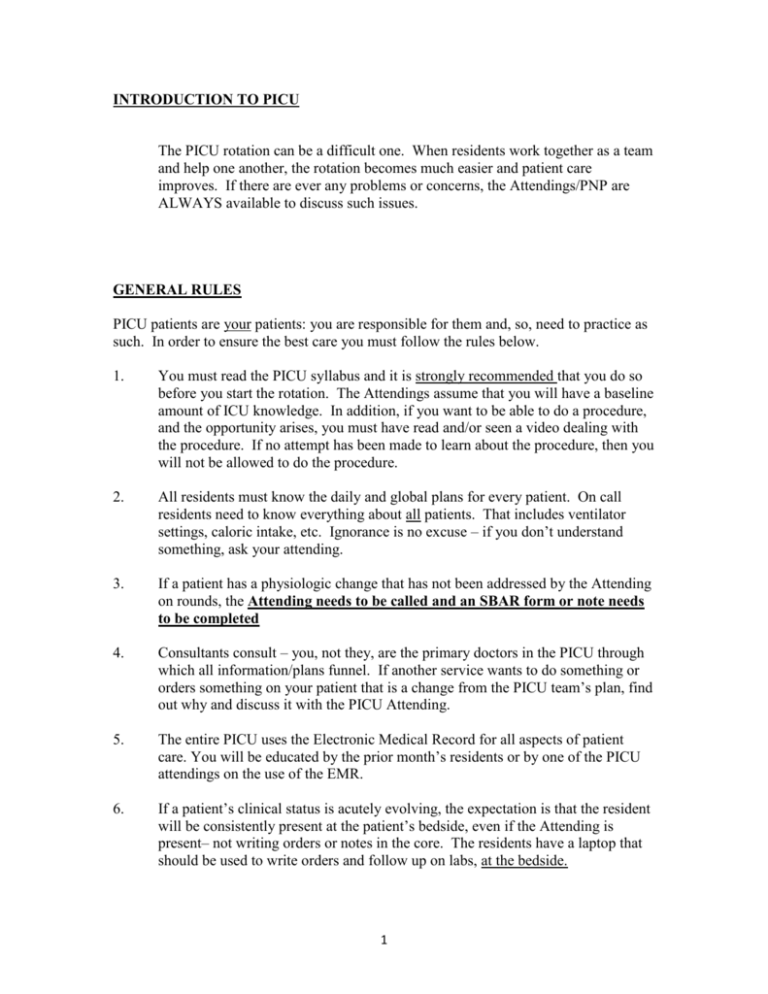
INTRODUCTION TO PICU The PICU rotation can be a difficult one. When residents work together as a team and help one another, the rotation becomes much easier and patient care improves. If there are ever any problems or concerns, the Attendings/PNP are ALWAYS available to discuss such issues. GENERAL RULES PICU patients are your patients: you are responsible for them and, so, need to practice as such. In order to ensure the best care you must follow the rules below. 1. You must read the PICU syllabus and it is strongly recommended that you do so before you start the rotation. The Attendings assume that you will have a baseline amount of ICU knowledge. In addition, if you want to be able to do a procedure, and the opportunity arises, you must have read and/or seen a video dealing with the procedure. If no attempt has been made to learn about the procedure, then you will not be allowed to do the procedure. 2. All residents must know the daily and global plans for every patient. On call residents need to know everything about all patients. That includes ventilator settings, caloric intake, etc. Ignorance is no excuse – if you don’t understand something, ask your attending. 3. If a patient has a physiologic change that has not been addressed by the Attending on rounds, the Attending needs to be called and an SBAR form or note needs to be completed 4. Consultants consult – you, not they, are the primary doctors in the PICU through which all information/plans funnel. If another service wants to do something or orders something on your patient that is a change from the PICU team’s plan, find out why and discuss it with the PICU Attending. 5. The entire PICU uses the Electronic Medical Record for all aspects of patient care. You will be educated by the prior month’s residents or by one of the PICU attendings on the use of the EMR. 6. If a patient’s clinical status is acutely evolving, the expectation is that the resident will be consistently present at the patient’s bedside, even if the Attending is present– not writing orders or notes in the core. The residents have a laptop that should be used to write orders and follow up on labs, at the bedside. 1 7. Find your PALS card and keep it with you. 8. This will be some of your first experiences with overnight call. Prepare by having ongoing good sleep habits, drink lots of water, and have a well-balanced diet. Sleep when you can in the unit. 9. Patients will be split as evenly as possible, with the sickest children going to the resident on call, as they will spend 24 hours at their bedside. It is important to as evenly as possible distribute the sick children, to each ER resident, anesthesia resident and the pediatric residents. Even if you don’t have the sickest patient you can still examine them and talk with the team about the plans. The senior most resident is in charge of distribution of the patient. 10. Remember – you are in charge of your education. Read during downtime, ask questions of all participants in the PICU: the attending, the nurses, the nutritionist, the pharmacist, the chaplain. The PICU team has a wealth of knowledge so ask questions. GOALS AND OBJECTIVES 1. Obtain an understanding of the pathophysiology of various critical illnesses in children 2. Learn to recognize, triage, and stabilize critically ill children and to realize one’s own limits of knowledge, skills, and stressors 3. Become familiar with invasive procedures and monitoring in the PICU 4. Become familiar with ethical issues within the PICU 5. Learn to read, critique, and apply medical literature appropriately 6. Participate as an integral member of the PICU team CURRICULUM CONTENT Respiratory Failure 1. Pathophysiology of different types of respiratory failure and their treatments 2. Bag mask ventilation and various modes of invasive and noninvasive positive pressure ventilation; 3. Interpretation of arterial blood gasses Circulatory Failure 1. Types of shock and their manifestations 2. Evaluation and resuscitation of children in shock 2 3. Monitoring of shock states 4. Use of Vasopressors and Inotropes Repair of Congenital Heart Disease 1. Types and post-operative management issues Acute Brain Injury 1. Causes and pathophysiology of various types of brain injury 2. Clinical signs of high intracranial pressure 3. Monitoring and management of high ICP Sedation, Analgesia and Paralysis 1. Strategies and pharmacology of various sedatives and analgesics 2. Use and complications of paralytic agents Metabolic/Endocrinologic Abnormalities 1. Pathophysiology and treatment of critically ill patients with endocrinologic diseases such as diabetic ketoacidosis, congenital adrenal hyperplasia, etc Hematologic and Oncologic Abnormalities 1. Evaluation and management of bleeding disorders 2. Management of oncologic emergencies Renal Failure 1. Pathophysiology and treatment of renal dysfunction and fluid management Ethics 1. Discussion of relevant ethical issues seen with the critically ill child 3 LECTURES Monday Tuesday 12-1PM case presentation Wednesday Thursday 12-1PM Lecture PICU Friday 12-1PM Lecture Equipment 12-1PM Lecture PICU 12-1PM Lecture PICU 12-1PM Nutrition Lecture 1-2PM Lecture PICU 1-2PM Lecture Pharmacy 12-1PM Lecture PICU 12-1PM Lecture PICU 12-1PM Lecture PICU Week 1 Week 2 Week 3 Week 4 Week 5 12-1PM Ethical case presentation The major teaching method is case-based instruction/discussion at the bedside. In addition, core lectures will be given by the PICU Attendings and supporting staff. Information about these lectures is available on the website. Attendance is mandatory for all residents not in clinic. The resident on call will handle issues within the unit if necessary to ensure the participation of all other team members. Residents will also participate as “Nurse for a Day” with an experienced PICU nurse. This will be assigned by the pediatric chief resident. EVALUATION METHODS The resident will be evaluated on his or her clinical and procedural skills, interest in learning and reading, organizational skills, and interactions with other members of the medical staff as well as patients and their families. These evaluations will occur via direct observation by the PICU Attendings/PNP and will be reported on departmental evaluation forms at the end of each rotation. The PICU Attendings also provide verbal mid rotation feedback. If a resident wishes feedback earlier in the rotation, he or she can ask an Attending/PNP for this information at anytime during the rotation. 4 CLINICAL RESPONSIBILITIES Morning Rounds 7 AM on weekdays 7 AM on weekends and holidays Every patient should be seen and examined and appropriate lab values and radiographic studies’ results should be obtained prior to morning rounds. During your PICU rotation, your work hours are officially 7am - after 4pm signout, or 5 PM signout on Thursday nights. The resident who was on Saturday overnight call will report after 24 hours on Monday morning. Morning rounds signout template-This template should be followed for rounds. 1 line about the patient Interval history or HPI: What happened overnight? Vital signs: Give ranges for this patient and talk about the abnormal vital signs. Urine output in(in cc/kg/hour) with 24hour I/O balance–attention should be paid to the last 8-12 hours if there has been a change. Basically, we want to know that you know what normal is and then talk about the outliers. Exam: short and focused on pertinent positives Review by Systems Respiratory – include vent settings or other O2 delivery devices; blood gas; meds (i.e. albuterol, heliox, steroids, etc.), CXR findings; consults called CV – inotropes/pressors or other meds such as antihypertensives; lines; consults called Neuro – sedatives, analgesics, and other meds (anti-epileptics – with drug levels); EEG findings or recent neuro-imaging findings; consults called FEN/GI – nutrition/IVF/TPN; ideally, for little babies, kcal/kg/day; most recent electroytes/LFT’s/pancreatic enzymes, etc.; medications; consults called H/O – most recent CBC or other labs; medications; consults called I/D – most recent cultures; list abx with levels; consults called Renal – most recent labs; medications; imaging; consults called Endocrine – medications and labs; consults called Social – pertinent findings; consults called Medications: As read by the pharmacist. We have a pharmacist on rounds and we will use her. We can talk about utility, dosing, think about drugs that are nephro or hepatotoxic, etc Assessment: one liner that shows you can synthesize what is going on with this patient Plans: Depending on the attending, this can be done by system or by reiterating plans discussed during the review of systems 5 IT IS ESSENTIAL FOR THE RESIDENTS TO EXAMINE EACH VENTILATOR AND IV PUMP TO ENSURE THE PROPER SETTINGS ARE IN PLACE AND BEING RECORDED Afternoon Rounds 4 PM, except Thursday which is at 5 PM Post-call residents and residents in clinic are not required to attend PM rounds Daytime Responsibilities Residents should frequently round on their patients in addition to completing the day’s tasks prescribed during rounds Orders All order writing is done electronically through CPOE. You should notify the patient’s nurse of ANY new or discontinued orders, especially if the order is written as STAT. Lexi-Comp online (http://online.lexi.com/crlonline) is our hospital-approved reference for medication. There are links to Lexi-Comp directly from Powerchart and also from the main hospital intranet page. It is prudent and necessary to check every order every day to make sure that you haven’t hit a soft stop or fallen off of the MAR. Compare active orders to what the patient should be getting to exactly what the patient is getting (MAR) every day. Tuesday is order renewal/revision day in PICU. Admissions All PICU admissions are admitted under the PICU Attending’s name, unless they are a trauma patient. The trauma patients are admitted under the trauma attendings, co-managed by us. The Attending must be notified of all admissions by the ER, 11 North senior resident, etc prior to acceptance. The PICU resident will contact the Attending once the new admission is evaluated and the resident has a treatment plan. It is the responsibility of the admitting resident to contact the patient’s PMD of the PICU admission either at the time of admission or the following morning. Transfer/Discharge Notes Any patient transferred or discharged from the PICU is to have a transfer/discharge summary and appropriate orders. It is the responsibility of the transferring resident to sign out to the accepting resident and primary pediatrician. This transfer/discharge note can be the daily progress note as well, with a detailed course for the accepting team Communication 6 PICU attending coverage is now 24 hours in-house. The attending pagers and cell phones are posted on the board in the back or the clerk has them. The attendings expect communication with any organ system change. It is better to overcommunicate than to under communicate. One of the most important things the Attendings expect is a plan. So remember to have one when you call! Communication with the surgery team should go through the chief or most senior resident. If you aren’t getting an answer from any consulting service, let your attending know. Unit Coverage A resident must be in the PICU at all times. Exceptions to this are during resident administrative meetings and when an Attending/PNP is present within the PICU. 7
